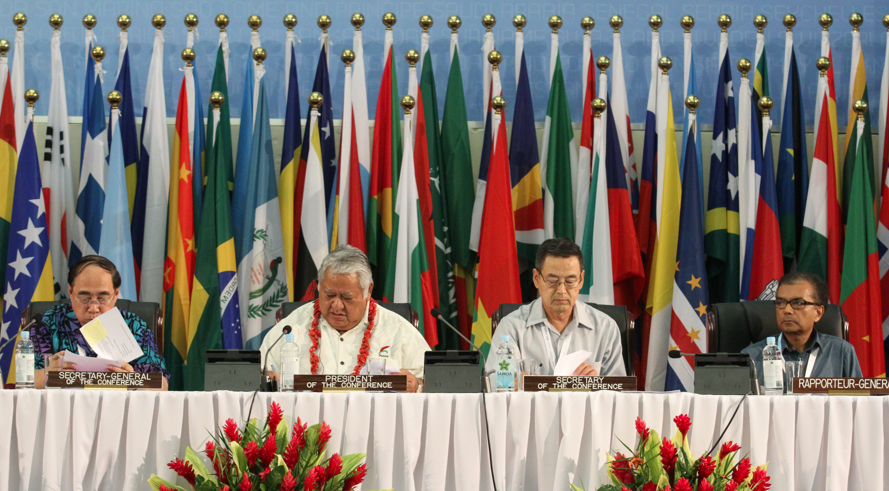Oceans, fisheries, the blue economy and forests featured in a number of events held and publications launched on the occasion of the Third International Conference on Small island developing States (SIDS).
 4 September 2014: Oceans, fisheries, the blue economy and forests featured in a number of events held and publications launched on the occasion of the Third International Conference on Small Island Developing States (SIDS).
4 September 2014: Oceans, fisheries, the blue economy and forests featured in a number of events held and publications launched on the occasion of the Third International Conference on Small Island Developing States (SIDS).
UN Secretary-General Ban Ki-moon and other UN executives highlighted the UN’s contribution to SIDS’s sustainable development, including efforts on climate change, disaster risk management (DRM) and oceans, during a high-level side event on ‘The UN System Partnering for the People of SIDS.’ Speaking at the event, Irina Bokova, UN Educational, Scientific and Cultural Organization (UNESCO) Director General, emphasized the importance of “effective, science-based management, which requires reliable data for sound policy decisions” to manage ocean biodiversity. Tuilaepa Sailele Malielegaoi, Prime Minister, Samoa, said addressing the gap in ocean science is a key priority for SIDS that is reflected in the Conference outcome document.
Panelists addressed sea level rise; ocean acidification, including the threats to coral reefs, ecosystem diversity, fish behavior and the pelagic food web; and tsunamis during a side event, ‘Coping with and adapting to ocean threats for resilient SIDS communities.’ Lorna Inniss, Coastal Zone Management Unit, Barbados, said the estimated cost of addressing sea level rise in Barbados is US$42 million, which the country has to pay to maintain its tourism sector, but detracts from investments in education and health. To address ocean threats, participants highlighted: investments in human capacity; enhanced observation systems; South-South cooperation; and integrated approaches. The Intergovernmental Oceanographic Commission (IOC) of UNESCO, the Secretariat of the Pacific Regional Environment Programme (SPREP) and the Governments of Samoa and Barbados organized the event.
Participants highlighted the role of coastal fisheries in strengthening food security, enhancing economic growth in isolated, rural communities, which in turn reduces urban drift, and reducing non-communicable diseases (NCDs) at a side event, ‘Inclusive value chains for livelihoods, trade and food security: the case of small-scale fisheries and the aquaculture industry in small island developing states.’ Noting challenges related to climate change, fishing pressure, habitat degradation, increasing populations and oceans acidification, participants stressed the need for conservation and management measures to ensure coastal fisheries’ sustainability and their future benefits. The UN Industrial Development Organization (UNIDO), the Secretariat of the Pacific Community (SPC) and the Forum Fisheries Agency (FFA) organized the event.
In a break from the Conference, UN Development Programme (UNDP) Administrator Helen Clark and Naoko Ishii, the Global Environment Facility (GEF) Chief Executive Officer, visited the Luatuanu’u community, one of 26 communities participating in the ‘Integration of Climate Change Risks and Resilience into Forestry Management in Samoa’ (ICCRIFS) project. Through the project, communities create a three-dimensional “Ridge to Reef” model of their area to visualize the entire ecosystem of their community, including its agricultural lands, forests and watersheds. Local leaders explained to Clark and Ishii how they use this visual model to make local forestry management decisions that can then inform national forestry plans. Ishii said “This project…demonstrates how local communities can serve as catalysts for effective action in the face of increasing threats from climate change that help sustain livelihoods and build resilience.”
Among the publications featured at the conference, the Food and Agriculture Organization of the UN (FAO) released a policy paper, ‘Global Blue Growth Initiative and SIDS,’ which introduces the Blue Growth Initiative (BGI). The Initiative aims to provide improved fisheries governance and wider ecosystem stewardship for sustainable socio-economic management of aquatic resources, in line with the Code of Conduct for Responsible Fisheries and the Voluntary Guidelines on Responsible Governance of Tenure of Land, Fisheries and Forests in the Context of National Food Security, among other approaches and guidelines. The brief describes four components of FAO’s BGI: marine and inland capture fisheries; aquaculture; livelihoods and food systems; and economic growth from ecosystem services.
FAO also highlighted its efforts on oceans and aquaculture in the Caribbean through a brief on ‘The Sustainable Intensification of Caribbean Fisheries and Aquaculture.’ The brief highlights challenges faced by Caribbean SIDS, whose fisheries are among the most globally overexploited stocks. It recommends, inter alia: transferring aquaculture technologies and production systems in the Caribbean, including through combining FAO technical assistance with private sector investment to scale up sustainable, economically viable aquaculture production.
In addition to others, the conference saw events hosted by UNESCO on underwater cultural heritage; and by the Pacific Islands Forum Secretariat, in partnership with the Secretariat of the Pacific Community and SPREP on ‘Our Sea of Islands, Our Livelihoods, Our Oceania – The Pacific Ocean Alliance.’ [SPC Press Release on Coastal Fisheries Event] [UNESCO Press Release on CEB Event] [UNESCO Press Release on IOC Event] [Publication: The Sustainable Intensification of Caribbean Fisheries and Aquaculture] [Publication: Global BGI and SIDS] [UNDP Press Release on Luatuanu’u] [UN Press Release][IISD RS Coverage]